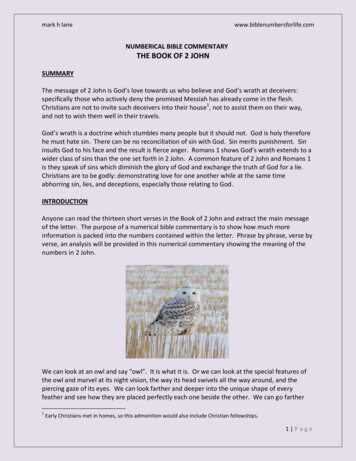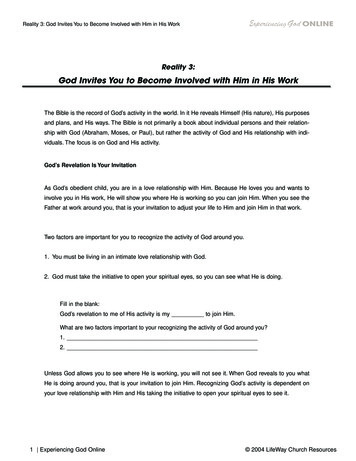
Transcription
The Church Is Persecutedand the Gospel SpreadActs 8:1–25LESSON GOALStudents will turn over the reign of their livesto King Jesus.LESSON OBJECTIVESStudents will be able to: Explain how persecution led to the spread of the church. Distinguish between the Samaritans’ response andSimon’s response to Philip’s message. Tell why God delayed the outpouring of the Spirit in thecase of the Samaritans. Describe Simon's’ heart problem and the solution Peteroffered.KEY VERSESymbol KeyCraft“You have neither part nor portion in this matter, for yourheart is not right in the sight of God.” —Acts 8:21Memory VerseAPPLICATIONObject Lesson Game Visual Aid ActivityRejoice that God’s kingdom spread.Love someone who has been your enemy and pray foran opportunity to share the Gospel with them.Examine your heart to see whether you have falsemotives for confessing submission to Christ.Q&AWork Sheet2Grade LevelNEXT WEEKPhilip Shares the Gospel with the EthiopianActs 8:26–40 2005 Grace Community Church. All Rights Reserved.Acts EL\7.1
The Church IsPersecuted andthe Gospel SpreadTeacher Planning SheetPREPAREObjectives/Truths to cover this week Personal ApplicationAs a result of my study in this passage, God wants me to Three ways students need to apply this passage are MaterialsNeeded:7.2/Acts EL POINTChoose from various ideas to point students to the coming Bible lesson. PROCLAIMChoose from various ideas to proclaim the Bible lesson.Presentation Ideas Praise/Music Ideas PRACTICEChoose ideas to help review and apply today’s lesson. 2005 Grace Community Church. Purchaser may reproduce for class purposes only.
The Church IsPersecuted andthe Gospel SpreadPREPAREWITH THE TRUTH“Therefore you shall lay up these words of mine in your heart and in your soul you shall teach them to your children.” —Deuteronomy 11:18–19Please take time to prepare your mind and heart to accurately handle the truths ofGod’s Word (2 Tim. 2:15). Read through the Bible background and study the truthscontained in this lesson. Crucial background information is included here that willaid you in understanding the Scripture.Bible BackgroundIntroductionPerhaps Satan believed he had secured a great victory against the Son of Manwhen the angry mob stoned Stephen. But Stephen’s death was not a defeat for theKingdom of God. Jesus, who has all authority under heaven, used Stephen’s deathand the following persecution to spread the good news of Himself throughoutJudea and Samaria. Acts 8:1–25 records the Kingdom’s advance into Samaria.While many Samaritans repented and entered God’s kingdom, one Samaritannamed Simon faked obedience in order to advance his own kingdom. While therecord of the Samaritans’ conversion and reception of the Spirit is primarily a testimony to the unstoppable advance of God’s Kingdom, Peter’s judgment of Simon’sbogus repentance is a warning to any who resent the coming of the King.The Persecution of the Church (Acts 8:1–3)Although the apostles had already suffered for preaching the name of Jesus (5:40),the murder of Stephen marked the beginning of widespread persecution of thechurch. One of those who persecuted the church was named Saul. Luke describeshow Saul, a Pharisee who had consented to the death of Stephen (8:1), tried todestroy the church. Saul was so zealous for the church’s obliteration that he wenthouse to house searching for believers. When he found them, whether they weremen or women, he put them in prison (8:3). Later in Acts, Paul tells how beforehis conversion he had voted for saints be put to death, he had “punished themoften in every synagogue,” and he had “persecuted them even to foreign cities”(26:11).Before persecution broke out against the church, the church had remainedcentered in Jerusalem, but after the death of Stephen, the church was “scatteredthroughout the regions of Judea and Samaria” (8:1). Even though many believersfled Jerusalem for the surrounding areas, the apostles remained to care for thosewho remained (8:2). It is likely that the majority of the believers who left wereamong the Hellenist while those who remained were largely Hebrews. Little didpersecutors like Saul realize that forcing the believers to flee Jerusalem would onlylead to the name of Jesus being proclaimed elsewhere.The Proclamation of Christ (Acts 8:4–13)The Gospel spread rapidly when “those who were scattered went everywherepreaching the word” (8:4). One of those who proclaimed the Gospel after leavingJerusalem was Philip (8:5). Philip was one of the seven men who had beenappointed to oversee the distribution of food in Acts 6:5. Philip went to the northof Jerusalem to the city of Samaria, the ancient capital of the northern kingdom ofIsrael. 2005 Grace Community Church. All Rights Reserved.Acts EL\7.3
The Church IsPersecuted andthe Gospel SpreadFollowing the Assyrian invasion of the northern kingdom in 722 B.C., the Assyriansforced the Israelites into exile and repopulated the land with Gentiles. TheSamaritans were the descendants of Gentiles who intermarried with the remainingIsraelites. Because of their mixed lineage, the Jews denigrated the Samaritans ashalf–breeds. The Samaritans’ sacred writings were based on the first five books ofthe Old Testament. Like the Jews, the Samaritans waited for a messiah but unlikethe Jews, they refused to worship at the temple in Jerusalem. The Jews andSamaritans had hated each other for centuries and each considered the otherheretical.Although most Jews hated the Samaritans, Philip followed his Lord’s example(John 4:1–42) and preached the Gospel to them. Luke summarizes Philip’smessage succinctly: Philip “preached Christ to them” (Acts 8:5). Just as the apostles had done in Jerusalem, Philip preached the death, resurrection, and crucifixion of Christ and called on the Samaritans to repent. No doubt Philip tookadvantage of the Samaritans expectation of a messiah and proclaimed that Jesuswas the Messiah whom they were waiting for (John 8:25–26).Philip had a successful ministry among the Samaritans who “with one accordheeded the things spoken by Philip” (Acts 8:6). The Samaritans rejoiced not onlywhen they heard Philip’s message but also when they saw the miraculous signsthat Philip was doing (vv.6–8). God demonstrated the authenticity of Philip’smessage by allowing him to do miracles such as casting out demons and healingthe lame and paralyzed (v.7). Between hearing Philip’s preaching about the“kingdom of God and the name of Jesus Christ” and seeing the miracles that Philipperformed, the Samaritans believed and were baptized (v.12). Just as Jesus hadpromised, the Gospel spread from Jerusalem to Samaria (Acts 1:8).To demonstrate how powerful God’s Gospel is, Luke described the Samaritansbefore their conversion. Before the Samaritans had obeyed Jesus, they heeded aman named Simon. Simon “practiced sorcery and astonished the people ofSamaria” (Acts 8:9). Sorcery was a mix of science and superstition, includingastrology, divination and the occult (MSB, 1648). Because Simon performedimpressive and mysterious deeds (whether through trickery or demonic enablement), the Samaritans listened to his claim that “he was someone great” (8:9). Theywere so deceived by Simon that they said “This man is the great power of God”(v.10). The Samaritans believed that Simon was somehow united with God and amanifestation of His power in bodily form. For a long time, the people “heededhim because he had astonished them with his sorceries” (v.12). Although theSamaritans had been deceived, the light of the Gospel dawned in their heartswhen they heard about Jesus, the Man who really is God, and when they saw themiracles Philip performed.The Samaritans were not the only ones convinced of Jesus’ supremacy. EvenSimon was convinced by Philip’s message and miracles. Although Simon did notrepent (8:21–22), he pretended to be a disciple, submitted to baptism andfollowed Philip (v.13). Once he had exalted himself as the “great power” but nowSimon could not deny that Jesus was the greater power. He followed Philiparound, continually amazed at the miracles Philip did (v.13). Simon would eventually reveal the jealousy in his heart, but for now, Luke uses him as dramatic proofthat the most wicked blasphemers cannot deny the power of the exalted Christ.The Prayer for the Samaritans (Acts 8:14–17)Even though the Samaritans had believed the Gospel and had been baptized indemonstration of their obedience to Christ, the Samaritans had not yet receivedthe Holy Spirit (Acts 8:16). Both in the early church and the church today, people7.4/Acts EL 2005 Grace Community Church. All Rights Reserved.
The Church IsPersecuted andthe Gospel Spreadreceive the Holy Spirit when they are first saved (1 Cor. 12:13). Although this isGod’s normal pattern, God delayed sending the Holy Spirit upon the Samaritansin order to emphasize that a new group of believers was about to be added intothe church.When the apostles in Jerusalem heard that the Samaritans “had received the wordof God” (Acts 8:14), the apostles Peter and John went to Samaria. After the apostles prayed for the Samaritans (8:15) and laid their hands on them (8:17), theSamaritans received the Holy Spirit. (Perhaps the reception of the Holy Spirit wasfollowed by a miraculous display like speaking in tongues which allowed allpresent to know that the Samaritans had received the Spirit.) Because theSamaritans did not receive the Spirit until the apostles came and prayed, the apostles were certain that the Samaritans had been included in the church. The eventwould also reveal to the Samaritans that they were under the apostles’ authoritysince they did not receive the Spirit until Peter and John prayed and laid theirhands on them. The outpouring of God’s Spirit upon the Samaritans was testimonyto the fact that God’s kingdom was spreading to the ends of the earth. Those whohad previously hated each other were now unified in one body.The Presumption of Simon (Acts 8:18–25)Not all the Samaritans rejoiced that God’s kingdom had advanced with such force.Even though Simon had professed belief in Christ and had been baptized, heresented the power that God had given the apostles over the Samaritans. Beforehe had been praised as the great power by the Samaritans who heeded him, butnow the Samaritans were obeying Jesus and his representatives the apostles.Desperate to regain control of his own little kingdom, Simon foolishly offeredPeter and John money for the ability to impart the Holy Spirit by the laying on ofhis hands (8:19). Simon thought that the apostles had power in the fingertips togive God to whom they chose. He did not understand that the apostles’ laying onof hands was simply a symbolic gesture that the apostles approved of theSamaritan’s salvation.Peter’s pronouncement against Simon is one of the strongest in Scripture. Peter toldSimon that he was currently going to hell (along with his money) since he thoughthe “gift of God could be purchased with money” (Acts 8:20). Because his heartwas not “right in the sight of God”, Simon had no real part with the church, eventhough he had mentally assented to the truth of Philip’s claims and had beenpublicly baptized (8:21). Even though Peter revealed that Simon was going to hell,he still told Simon that he would be forgiven if he repented (8:22). But until Simonrepented, he would remain “poisoned by bitterness and bound by iniquity” (8:23).Neither a profession of faith nor baptism could transfer Simon from Satan’skingdom to God’s as long as he remained a slave to sin. The only antidote to hispoisoned heart was repentance and faith. Unwilling to submit himself to theGospel’s requirements, Simon asked Peter to pray that he would escape judgment.Simon knew that Peter represented the true God but showed no evidence ofwanting to submit himself to the Lordship of Christ.ConclusionFollowing their time in the ancient capital of Samaria, the apostles returned toJerusalem. On their way home, the apostles preached in many of the villages ofSamaria (8:25). God’s kingdom continued to spread as more and more of theSamaritans responded in faith to the Gospel. Neither persecution, false prophets,or racial hatred could stop God’s kingdom from advancing. Even though thevictory of God’s kingdom is certain, each person must examine their heart to seewhether they have embraced King Jesus. Neither a vague belief in God’s power, a 2005 Grace Community Church. All Rights Reserved.Acts EL\7.5
The Church IsPersecuted andthe Gospel Spreadconfession of faith, nor an act of baptism will rescue someone from their ownwickedness. Claiming submission to Christ does not release one from being“bound by iniquity” (8:23). Like Simon, many have welcomed God’s kingdomwith their mouths but have resented it in their hearts.POINTTO THE TRUTH“Give ear, O my people, to my law; incline your ears to the words of my mouth.”—Psalm 78:1This section includes questions to review last week’s lesson and ideas to preparestudents for this week’s lesson. Choose from the following ideas to point to thetruths of this lesson.Review QuestionsWhat were some characteristics of Stephen?He was a man of good reputation, full of the Holy Spirit, wisdom and faith.Who did Stephen preach to?Stephen preached to those in Greek-speaking synagogues.Who did Stephen speak to?Stephen spoke to the Sanhedrin.What did Stephen tell the Sanhedrin?Stephen told them of God’s plan for Israel and how the Jews were rejecting thetrue Messiah.What did the Jews think of Stephen’s message?They were very angry at Stephen. They gnashed their teeth in anger at him,covered their ears and cried out in a loud voice.What did the Jews do to Stephen?They picked up stones and hit Stephen with them to kill him.Difficult ConceptsPersecution: The Christians were persecuted by Jewish people and by the Romangovernment. They were thrown in jail and sometimes even killed. The head of theRoman government was called Caesar, and he demanded that people call him“lord.” Because Christians would only call Jesus Christ “Lord,” the Roman government arrested and killed them as traitors. Explain the concept of laws in the UnitedStates. Just like it’s against the law to kill someone, being a Christian was againstthe law.Magic: Simon used magic to make himself famous. He claimed to be the greatpower of God. His magic may have just been tricks, like when a man at the circuspulls a rabbit out of a hat. However, his magic may also have been an evil power.Delayed Outpouring of the Spirit: The Samaritans were half–Jewish, but theyhated the Jews. The Jews hated them, too. When the Gospel started to spread, Jewsmay have doubted that Samaritans could be Christians. However, the Holy Spirit7.6/Acts EL 2005 Grace Community Church. All Rights Reserved.
The Church IsPersecuted andthe Gospel Spreadcame on the Samaritans just like it did the Jews. Because the Holy Spirit came tothe Samaritans in a special way, God showed that the Samaritans were Christiansjust like the Jews. Use the illustration of an adopted child getting the same lastname as the rest of the family. Even though he came later, he gets the same nameand everyone recognizes he belongs to the family.Black and White HeartsMaterials: black and white clayDirections: Give the students both black and white clay. Discuss with them howevery person is born with a black heart. Help them to make a heart with the blackclay. Talk about the bad attitudes and actions that go along with a black heart.Next have them create a white heart. Explain that the only people who can havea white heart are those who tell God that they were wrong and who trust in Himto pay for their sins. In today’s lesson we will learn about a man named Simon whowould not tell God that he was wrong. He had a black heart. We will also learnabout a group of people who trusted God and told God that their sins were wrong.These people were given white hearts by God.TravelingPhilip was traveling to Samaria. Once he arrived he shared the gospel with thepeople there. To illustrate to the students the idea of traveling to another place givethem a suitcase and clothes. Ask the students what they would take on a trip.Explain that because of the persecution that was happening many of the believershad to pack their things and leave quickly to escape the persecution.CharadesHave the children act like something they are not. Prepare several ideas ahead oftime. Have a student act like an animal such as a cat purring and meowing, or likean object, such as a tree or a train. Go on to explain that in today’s lesson Simonacts like something he was not. He was pretending.False MotivesDiscuss with your students what false motives are. Ask them if they are ever niceto their brothers or sisters just so they won’t tell their parents on them for doingsomething bad. Ask if they are ever kind at school just so they can get a toy fromthe person they’re being nice to. Instead of being kind or nice because that’s theright thing to do, explain they are being kind or nice with false motives. To demonstrate this even further, act out a scene where a student shows false motives. Havethe student say nice things to a teacher. When the teacher turns around, have thestudent whisper to the class that he hopes the teacher will give him an extra snackfor being nice. Or, act out being helpful around the house right at bedtime so theparents will let the child stay up late. 2005 Grace Community Church. All Rights Reserved.Acts EL\7.7
The Church IsPersecuted andthe Gospel SpreadPROCLAIMTHE TRUTH“Telling to the generation to come the praises of the LORD, and His strength andHis wonderful works that He has done.” —Psalm 78:4This section includes the Bible lesson, lesson questions, and praise and worshipideas. Song suggestions are included that you can use to proclaim your worshipto God. Use the lesson questions to check the students’ understanding. Thissection also includes various presentation ideas to use alongside the teachingtime. Read the Bible passage several times before you read these pages. Allteaching should be done right from the Bible.Bible LessonPassage OutlineThe Persecution of the Church (Acts 8:1–3)The Proclamation of Christ (Acts 8:4–13)The Prayer for the Samaritans (Acts 8:14–17)The Presumption of Simon (Acts 8:18–25)Reading of the TextRead Acts 8:1–25.IntroductionHave you ever ridden a horse and tried to steer it in the direction you want it togo? For those mules that are stubborn this can be a real challenge. Even thoughyou are the one to be in control, they resist your instruction at every turn. Nomatter how hard you pull on the reigns, they can be totally unwilling to submit toyour authority. Many people respond just as stubbornly to the Gospel. Eventhough they profess to be followers of Christ, they never seem to want to submittheir lives to His authority. As reigning King, Jesus deserves such submission. Tothose who fail to submit there are grave consequences. Such stubbornness is seenin today’s lesson through a Samaritan named Simon. To look at one’s failure tosubmit to Christ, let us now look into Acts 8:1–25.Lead–off QuestionsLOQ: At the beginning of today’s lesson, who do we see persecuting the church?Answer: One of those who persecuted the church was named Saul. We learnedin last week’s lesson that Saul was the man who had held the coats of those whowere stoning Stephen. Saul hated Christ, and all those who followed Him. Infact, he hated the church so much that he even went from house to housesearching for believers. When he found them he had them thrown in prison.LOQ: How did this persecution lead to the spread of the gospel?Answer: Before persecution broke out against the church, the church hadremained centered in Jerusalem. Yet because of persecution, Luke writes thatmany had fled Jerusalem and traveled to other surrounding areas in an effort toavoid the persecution. Little did persecutors like Saul realize that forcingbelievers to flee Jerusalem would only lead to the name of Jesus being7.8/Acts EL 2005 Grace Community Church. All Rights Reserved.
The Church IsPersecuted andthe Gospel Spreadproclaimed elsewhere. The Gospel began to spread rapidly when “those whowere scattered went everywhere preaching the word” (8:4).LOQ: Of those who fled Jerusalem who do we see preaching the gospel intoday’s lesson?Answer: One of those who proclaimed the Gospel after leaving Jerusalem wasPhilip. Like Stephen, Philip was one of the seven men who had been chosen tooversee the care for the widows in last’s week’s lesson. Philip went to the northof Jerusalem to the city of Samaria.LOQ: What people group do we see Philip preaching to in Samaria?Answer: That Philip escaped persecution by fleeing to Samaria is interesting.Those living there would have been Samaritans. Like the Jews, the Samaritanshad waited for a messiah for many years. Yet the Jews and Samaritans had hatedeach other for centuries and each considered the other to be disgusting and vilebefore God. Although most Jews hated the Samaritans, Philip followed his Lord’sexample and preached the Gospel to them. Just as the apostles had done inJerusalem, Philip preached the death, resurrection, and crucifixion of Christ andcalled the Samaritans to repent. In preaching that Jesus was the Messiah, Philipunderstood that the Samaritans were in need of salvation also.LOQ: How do the Samaritans respond to the gospel?Answer: The Samaritans rejoiced not only when they heard Philip’s message butalso when they saw the miraculous signs that Philip was doing. God had givenPhilip the power to do miracles such as casting out demons and healing thelame and paralyzed (8:7). Between hearing Philip’s preaching about the kingdomof God and the name of Jesus Christ and seeing the miracles that Philipperformed, the Samaritans believed and were baptized. Just as Jesus had promised, the Gospel spread from Jerusalem to Samaria (Acts 1:8).LOQ: Who had the Samaritans followed before following Christ?Answer: Before the Samaritans had obeyed Jesus, they obeyed a man namedSimon. Simon “practiced sorcery and astonished the people of Samaria (8:9).Because Simon performed impressive and mysterious deeds, the Samaritanslistened to his claim that “he was someone great” (8:9). They were so deceivedby Simon that they thought he was somehow connected to God. This howeverdid not stop the Gospel from doing a work in their hearts. Even though theSamaritans had been deceived, they could not ignore the truth that Jesus, theMessiah, really was God in the form of a Man. Simon was just a pretender.LOQ: How does Simon respond to Philip's message?Answer: Even Simon was convinced by Philip’s message and miracles. AlthoughSimon did not repent (8:21–22), he pretended to be a disciple by partaking inbaptism and following Philip. Once he had exalted himself as the great power,but now Simon could not deny that Jesus was the greater power. He followedPhilip around, continually amazed at the miracles Philip did.LOQ: What does God delay in giving the Samaritans who had submitted toChrist and repented of their sin?Answer: Even though the Samaritans had believed the Gospel and been baptizedin demonstration of their obedience to Christ, the Samaritans had not yet 2005 Grace Community Church. All Rights Reserved.Acts EL\7.9
The Church IsPersecuted andthe Gospel Spreadreceived the Holy Spirit. In most cases, new believers generally receive the HolySpirit at the moment they are saved (1 Cor 12:13). Yet God delayed sending theHoly Spirit upon the Samaritans in order to emphasize that a new group ofbelievers was about to be added into the church.LOQ: Why do the apostles leave Jerusalem to visit the new believers there inSamaria?Answer: The apostles left Jerusalem so that they could pray for those Samaritanswho were now believers. After the apostles prayed for the Samaritans and laidtheir hands on them, the Samaritans received the Holy Spirit. Because theSamaritans did not receive the Spirit until the apostles came and prayed, theapostles were certain that the Samaritans had been included in the church.Those who had previously hated each other were now unified in one body. Thisoutpouring of God’s Spirit upon the Samaritans was evidence to the fact thatGod’s kingdom was spreading to the ends of the earth.LOQ: How does Simon react to the pouring out of the Spirit there in Samaria?Answer: Even though Simon had professed belief in Christ and had beenbaptized, he resented the power that God had given the apostles over theSamaritans. In his desire to regain control and power over the Samaritans, Simonfoolishly offered the apostles money for ability to give out the Spirit through thelaying on of hands. Simon though that the apostles had the power of God in thetips of their fingers. He did not understand that the laying on of hands wasmerely to symbolize that the apostles were confident in the Samaritans salvation.LOQ: How does Peter rebuke the unrepentant Simon?Answer: Peter rebukes Simon by telling him that he was currently going to hellbecause he thought the “gift of God could be purchase with money” (8:20).Because his heart was not “right in the sight of God,” Simon had no real partwith the church. Despite having professed to believe and partaken in baptism,Simon had never genuinely submitted to Christ. Even though Peter revealed thatSimon was going to hell, he still told Simon that he would be forgiven if herepented (8:22).LOQ: How does Peter describe the unrepentant Simon?Answer: Peter stated that until he repented, Simon would continue to be“poisoned by bitterness and bound by iniquity” (8:23). Simon’s actions hadproven that he was still a slave to sin. He had only the desire to please and obeyhimself, not Christ. As long as he remained a slave to sin, neither a profession offaith nor baptism could transfer Simon from Satan’s kingdom to God’s.According to the Gospel, the only solution to Simon’s fallen condition wasgenuine faith and repentance.LOQ: How does Simon respond to Peter’s invitation of freedom from sin?Answer: At the end of today’s lesson, we see that Simon asks Peter to pray thathe would escape judgment. Simon knew that Peter represented the true God butshowed no evidence of wanting to submit himself to the Lordship of Christ.Simon had remained unwilling to heed the Gospel’s requirements: to have faithin Jesus Christ and repent of one’s sin.7.10/Acts EL 2005 Grace Community Church. All Rights Reserved.
The Church IsPersecuted andthe Gospel SpreadSummaryThe death of God’s servant Stephen was not going to stop God from advancing Hiskingdom. Jesus, who has all authority under heaven, used Stephen’s death and thefollowing persecution to spread the good news of Himself throughout other partsof the world as He promised. One example of this was a man by the name ofPhilip. Philip was a follower of Christ who had fled Jerusalem to Samaria in orderto escape persecution. During his stay there in Samaria, Philip faithfullyproclaimed the gospel. While many Samaritans responded by believing in Christand repenting of their sin, one Samaritan named Simon faked obedience in orderto advance his own kingdom. Even though he believed in Jesus, Simon remainedunwilling to repent of his sin and submit to Christ. He merely pretended to be afollower of Christ so that he would receive the gift and power of the Holy Spirit.The apostle Peter recognized the sinful and unrepentant state of Simon’s heart.Peter’s rebuke of Simon’s bogus repentance is a warning to any who resist submitting to the reign of the Lord Jesus Christ.ApplicationIn today’s lesson persecution was unable to stop God’s kingdom from advancing.Even though the victory of God’s kingdom is certain, each person must examinetheir own heart to see whether they have truly submitted the reign of King Jesus.Neither a vague belief in God’s power, a confession of faith, nor an act of baptismwill rescue someone from their own wickedness. Claiming submission to Christdoes not release one from being “bound by iniquity” (8:23). Like Simon, manyhave welcomed God’s kingdom with their mouths but have rejected Him in theirhearts. May each of us examine our actions to see if we have demonstrated truerepentance and faith in Christ.Presentation IdeasA Beka Book Flash–A–Cards Use appropriate A Beka Book Flash–A–Cards with the lesson.Betty Lukens Flannel GraphUse appropriate flannel graph pieces with the lesson.Act It OutAct out a scene where two students or teachers act out false motives. One studenthas acts in a particular way with another student with false motives such as popularity or for what the student has.SimonyAsk the students if they know what the word “simony” means. Give a prize to thestudent who can guess correctly. Have the students look up this word in thedictionary. In today’s lesson we will learn where this word came from.Freeze FrameFirst, dramatize Saul’s persecution of the church. This may be done on video toshow at the beginning of teaching time; otherwise, dramatize it simply with twocharacters, one Saul and another believer being “persecuted.” The first three versesof the chapter could be read as narration. Then, have the scene “freeze” either bypausing the video or having the characters stand as still as statues. Finally, drama 2005 Grace Community Church. All Rights Reserved.Acts EL\7.11
The Church IsPersecuted andthe Gospel Spreadtize the remainder of the lesson with the frozen scene in the background, andexplain that while persecution was happening, the gospel was spread and morepeople became Christians.Simon’s HeartBlow out the inside of an egg. The hole can be concealed with wax or a smallamount of tape. Show the class a regular egg and the one that has been blown out.Ask if they see any differences. First, break open the regular egg and show themthe yolk. Then, crack the hollow egg and show them that it is empty. Discuss howSimon looked the same on the outside, but was missing something inside.The Spread of t
The Gospel spread rapidly when “those who were scattered went everywhere preaching the word” (8:4). One of those who proclaimed the Gospel after leaving Jerusalem was Philip (8:5). Philip was one of the seven men who had been appointed to oversee the distribution of fo










